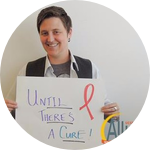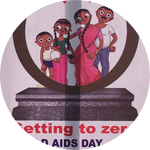About This Project
The goal of this study is to explore how stigma differentially affects cisgender women and hijras/transgender women living with HIV in Hyderabad, India. Individuals living with HIV are being recruited to complete a structured survey and qualitative interviews, conducted in the South Asian languages of either Hindi/Urdu or Telugu. The study aims to better understand the processes by which HIV and gender nonconformity stigma socially operate in the Hyderabadi context.
Ask the Scientists
Join The DiscussionWhat is the context of this research?
Though there have been many advances in recent years in HIV medical treatment, HIV continues to be a heavily stigmatized disease (Kempf et al., 2010). HIV stigma may be a driving force in creating and maintaining health disparities among cisgender women and hijras/transgender women living with HIV in India (Fikree & Pasha, 2004). Widely held sentiments about the marginalized status of people living with HIV create obstacles to the provision of efficient medical care and compassionate psychosocial support. HIV stigma often increases pre-existing social prejudice, disproportionately affecting individuals already socially marginalized for other reasons, such as sexual orientation, gender nonconformity, occupation, or caste (Kang, Rapkin, Remien, Mellins & Oh, 2005).
What is the significance of this project?
Research to date in India has only minimally focused on how cisgender women and hijras/transgender women living with HIV experience stigma and how this stigma may shape mental health and access to medical care. Research suggests that cisgender women who are living with HIV in India experience heightened stigma and discrimination for their HIV status when compared to their male partners, despite the fact that the majority of HIV positive women become infected by their husbands (Mohite, Mohite & George, 2015; Priya, 2003; Gangakhedkar & Bentley, 1997). Transgender women and hijras may face heightened discrimination due to the social exclusion of their gender identity and the taboo nature of their gender expression in South Asian culture.
What are the goals of the project?
Addressing the intervention needs of women living with HIV in India necessitates a nuanced analysis of how gender inequities contribute to disparities in care. To address these gaps in the current research, this study will explore how HIV stigma differentially affects cisgender women and hijras/transgender women living with HIV/AIDS in Hyderabad, India. In Phase 1, people living with HIV will be asked to participate in a survey regarding their experiences with HIV stigma, mental health, and access to medical care. In Phase 2, a subset of survey respondents will be asked to participate in an in-depth interview on how various social factors, such as gender roles, gender nonconformity stigma, caste, poverty and religion shape their experiences of HIV stigma.
Budget
Because our project is international, the cost of traveling between North America and India is the largest expense to the project. Other costs include the purchase of digital recorder, batteries, and memory cords; software to qualitatively analyze the interviews; and the use of transcription and translation services in India.
Endorsed by
Meet the Team
Affiliates
Team Bio
In India, our team also includes Sabitha Gandham and Beaulah Thomas in Hyderabad, India. Sabitha is employed by our collaborating research organization in Secunderabad, SHARE India. She has been primarily responsible for recruiting and interviewing Telugu-speaking subjects. Beaulah has been responsible for translating study documents into Hindi and Telugu. She has also translated and transcribed interviews from Telugu to English.
Sameena Azhar
Sameena Azhar is a PhD candidate in the School of Social Service Administration at the University of Chicago. She has completed a Bachelor of Arts degree at the University of California, Berkeley, and Master’s degrees in Social Work and Public Health at the University of Pennsylvania. She has more than a decade of clinical and research experience in the fields of HIV, mental health, and substance abuse. Ms. Azhar’s dissertation research pertains to HIV stigma and gender inequity of cisgender women and hijras/transgender women living with HIV in Hyderabad, India. After doctoral degree completion, she would like to pursue a career in international social work, working to develop programs that improve the mental health of ethnic and sexual/gender minority populations, particularly those impacted by HIV and gender-based violence. Ms. Azhar is licensed in the states of Illinois and California as a clinical social worker.
Jason Vaudrey
Jason Vaudrey completed his Master of Public Health at San Francisco State University in 2005 and has 15 years of experience in HIV and reproductive health research. He has worked with men who have sex with men, injection drug users, and low-income young men who have been disproportionately affected by HIV. Mr. Vaudrey has also been a health educator and researcher in reproductive health for nearly a decade. He has worked with pregnant and parenting teens and evaluated programs created by the State of California in determining their effectiveness at meeting program goals. Currently, Mr. Vaudrey is an elementary school teacher with San Francisco Unified School District.
Lab Notes
Nothing posted yet.
Project Backers
- 0Backers
- 0%Funded
- $0Total Donations
- $0Average Donation



